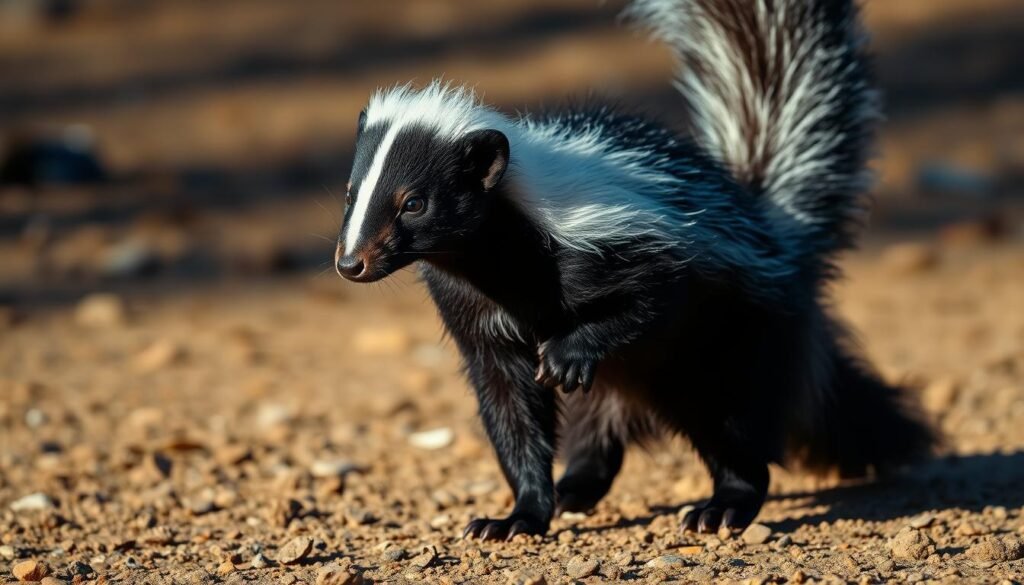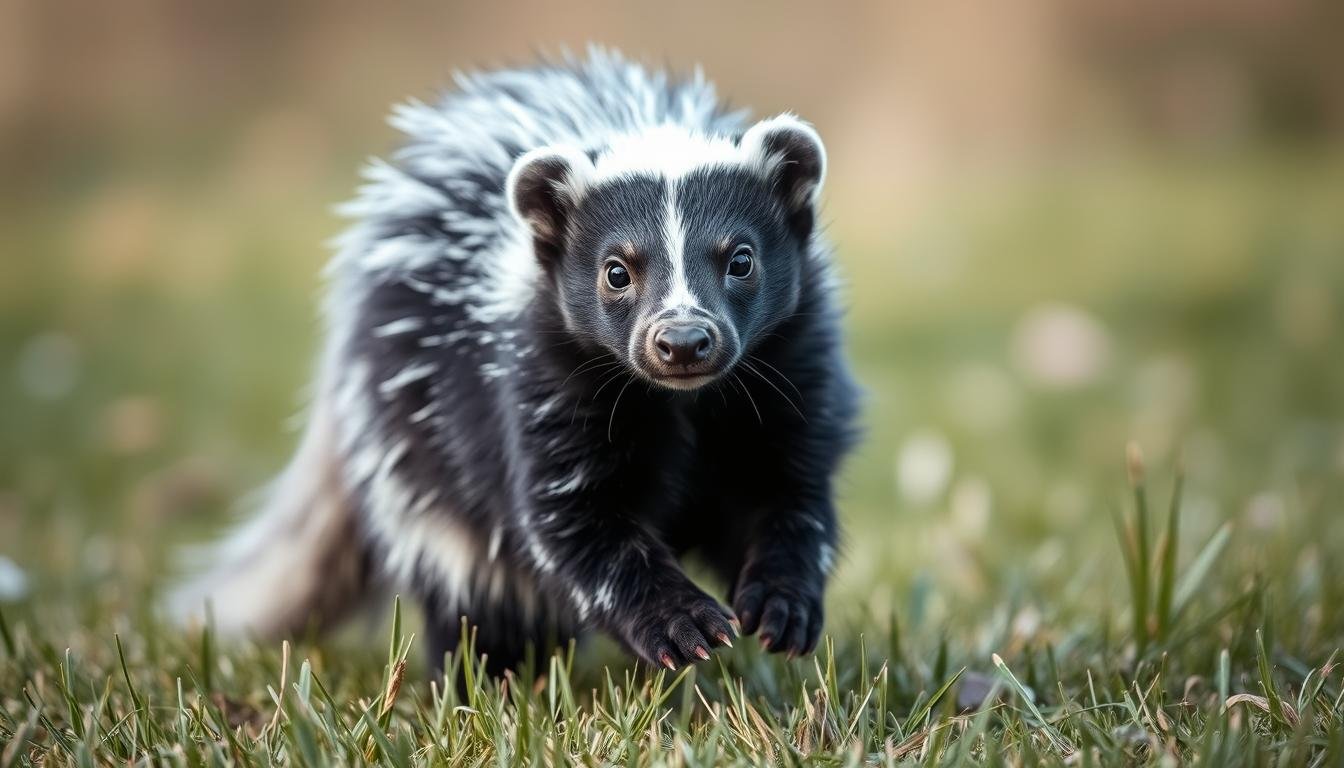Why Do Skunks Stomp Their Feet? You’ve probably seen a skunk before, and hopefully, it was from far away. Skunks have unique ways to defend themselves, like stomping their feet when they feel threatened.
Learning about skunk behavior and how they react to threats can teach us a lot about animal behavior. By looking into this behavior, we can understand how skunks deal with their surroundings and threats.
As you continue reading, you’ll learn why skunks stomp their feet. You’ll also see how this behavior fits into their overall actions and how they interact with their world.
Contents
- 1 Understanding Skunk Behavior
- 2 Skunk Defense Mechanisms Overview
- 3 Why Do Skunks Stomp Their Feet When Threatened?
- 4 The Science Behind Skunk Foot Stomping
- 5 Other Defensive Behaviors Skunks Display
- 6 How to Respond When a Skunk Stomps Its Feet
- 7 Conclusion: Why Do Skunks Stomp Their Feet?
- 8 FAQ
- 8.1 What does it mean when a skunk stomps its feet?
- 8.2 Why do skunks stomp their feet instead of spraying immediately?
- 8.3 Can skunks stomp their feet and spray at the same time?
- 8.4 How should you react when a skunk stomps its feet?
- 8.5 Are skunks likely to stomp their feet in residential areas?
- 8.6 Can skunk foot stomping be a sign of other issues besides feeling threatened?
- 8.7 How can you prevent skunks from stomping their feet near your home?
- 8.8 Is skunk foot stomping a sign of rabies or disease?
Understanding Skunk Behavior
It’s important to understand skunk behavior to appreciate their role in nature. Skunks are mostly active at night. This nocturnal nature shapes their behavior. [Why Do Skunks Stomp Their Feet?]
Skunks live in forests, grasslands, and even cities. Their ability to adapt to different places shows their strength. They eat insects, fruits, and small animals. This varied diet helps them survive in different environments.
Skunks usually live alone, except during mating. They communicate through scent, sounds, and body language. Foot stomping is a warning sign when they feel scared.
Studying skunk behavior helps us understand their defensive actions. This knowledge is key for those who meet skunks in the wild or at home. It promotes living in peace with these animals.
Skunk Defense Mechanisms Overview
Skunks have many ways to protect themselves from predators. One key method is spraying a strong-smelling liquid from their backside. [Why Do Skunks Stomp Their Feet?]
This potent defense scares off predators. Skunks also use other signals like raising their tail and making loud noises. These signals warn others to stay away.
- Spraying a foul-smelling secretion to deter predators
- Raising their tail to signal warning
- Making loud noises to alert potential threats
- Stomping their feet to signal agitation or warning
Knowing about these defensive mechanisms is key for wildlife safety. Spotting warning signs helps you avoid trouble with skunks. Keeping a safe distance and moving slowly can prevent skunks from getting scared.
Skunk defense goes beyond just spraying. It includes many behaviors to keep them safe. Understanding these skunk defense strategies helps you stay safe and respect these animals.
Why Do Skunks Stomp Their Feet When Threatened?
Skunks stomp their feet when they feel threatened. This action is a warning to predators. It shows the skunk is ready to defend itself. [Why Do Skunks Stomp Their Feet?]
When a skunk feels threatened, it doesn’t spray right away. It starts by stomping its feet. This warns others of its discomfort and readiness to defend.
Foot stomping is a warning sign. It tells threats that the skunk is alert and ready to defend. Understanding this behavior helps us see how skunks defend themselves.
Key Aspects of Skunk Foot Stomping
| Behavior | Purpose | Context |
|---|---|---|
| Foot Stomping | Warning Signal | Initial response to a perceived threat |
| Hissing/Growling | Escalation of Threat Response | Accompanies foot stomping as a further warning |
| Spraying | Last Resort Defense | Used if the threat persists despite initial warnings |
The table shows foot stomping is key in a skunk’s threat response. It’s an early warning system. This behavior is important in animal behavior, showing how skunks adapt and respond to dangers. [Why Do Skunks Stomp Their Feet?]
In conclusion, skunk foot stomping is a vital part of their defense. It warns potential threats. Understanding this behavior gives us insight into animal behavior and how skunks interact with their world.
The Science Behind Skunk Foot Stomping
Skunks have a special way to defend themselves by stomping their feet. This action is more than just a simple reflex. It involves their nervous system and is shaped by their surroundings and past experiences.
Research into skunk behavior reveals that foot stomping is a warning to predators. It’s often paired with other defensive moves, like raising their tail and showing off their smell. These actions together aim to scare off predators without using their smelly secretion.

Studies on defensive mechanisms in wildlife show that skunks are not the only ones using foot stomping as a warning. But, skunks have a unique way of combining these behaviors. This shows how adaptable skunks are to their environment and their smart defense strategies.
In wildlife encounters, knowing about skunk behavior is key for both humans and animals. Spotting signs of fear or agitation in skunks, like foot stomping, can help avoid trouble. By respecting their space and understanding their warning signs, we can live peacefully with these interesting animals.
Other Defensive Behaviors Skunks Display
Skunks don’t just stomp their feet when threatened. They use many tactics to keep predators away. Knowing these behaviors helps us appreciate skunks more and stay safe around wildlife.
Skunks have different ways to defend themselves, including:
- Visual displays: They raise their tail and show off their smell warning.
- Chemical deterrents: Their famous spray is a strong defense.
- Auditory warnings: They may hiss or growl, along with stomping their feet.
These actions are key for skunks to survive. They warn off threats. By knowing these signs, you can handle skunk encounters better.
| Behavior | Purpose |
|---|---|
| Foot Stomping | Warning signal |
| Visual Displays | Threat deterrence |
| Chemical Deterrents | Potent defense against predators |
Learning about skunk defense helps us live safely with wildlife. By understanding their behavior, we can handle skunk encounters better.
How to Respond When a Skunk Stomps Its Feet
Skunks stomp their feet to warn of danger. Knowing how to react is key. When you see a skunk doing this, your main goal is to safely calm the situation.
Residential Area Encounters
If a skunk stomps its feet near your home, stay calm and keep a safe distance. Don’t make sudden moves or loud noises. These can upset the skunk more. [Why Do Skunks Stomp Their Feet?]
Slowly back away and let the skunk have a clear path to leave. If the skunk is near your pet or child, move them to safety slowly. Don’t turn your back on the skunk.
When you’re out hiking or doing outdoor activities, watch your surroundings. This helps avoid surprising a skunk. If a skunk stomps its feet, stop moving right away and think about what to do next.
Let the skunk have a clear path to leave and back away slowly. Don’t wear perfume or cologne, as these can attract skunks. Keeping your pets on a leash can also prevent unwanted meetings.
Understanding how to react to a skunk stomping its feet can help you avoid bad encounters. This way, you can enjoy the outdoors more confidently.
Conclusion: Why Do Skunks Stomp Their Feet?
Skunks stomp their feet as a warning when they feel threatened. This is a key part of their defense. It also includes a strong-smelling spray. Knowing about skunk behavior helps keep you safe and them well.
If you see a skunk stomping its feet, stay calm. Let it leave without any trouble. Keeping a safe distance and being aware of your surroundings helps avoid unwanted interactions. This way, you can live safely with these special animals.
Wildlife safety is something we all need to work on. Knowing about animal behavior is crucial. By being informed and taking the right steps, we can all live in harmony with nature.
See Also: Discover Why Giraffes Lick Their Own Bodies
FAQ
What does it mean when a skunk stomps its feet?
When a skunk stomps its feet, it’s a warning. It means the skunk feels threatened or cornered. [Why Do Skunks Stomp Their Feet?]
Why do skunks stomp their feet instead of spraying immediately?
Skunks stomp their feet as a warning. They hope to scare off threats without spraying. They save spraying for more serious threats.
Can skunks stomp their feet and spray at the same time?
Skunks can do both, but they usually don’t. They stomp their feet first as a warning. Then, they spray if needed.
How should you react when a skunk stomps its feet?
Stay calm and slowly back away. Give the skunk a clear path to leave. Avoid sudden movements to prevent spraying. [Why Do Skunks Stomp Their Feet?]
Are skunks likely to stomp their feet in residential areas?
Yes, skunks may stomp their feet in residential areas. They do this if they feel threatened by pets, people, or other animals.
Can skunk foot stomping be a sign of other issues besides feeling threatened?
Skunk foot stomping is mainly a threat response. But, it can sometimes be linked to other behaviors or health issues. This is less common, though.
How can you prevent skunks from stomping their feet near your home?
To keep skunks away, secure your trash and remove food sources. Use deterrents to discourage them from coming near your property.
Is skunk foot stomping a sign of rabies or disease?
Skunk foot stomping isn’t a clear sign of rabies or disease. But, if a skunk acts aggressively or strangely, get professional advice.

Zyair Larson, based in Denver, Colorado, has over 12 years of experience studying animal behavior. He has worked with the World Wildlife Fund (WWF) and National Geographic, researching wildlife and sharing insights on animal habits globally.

